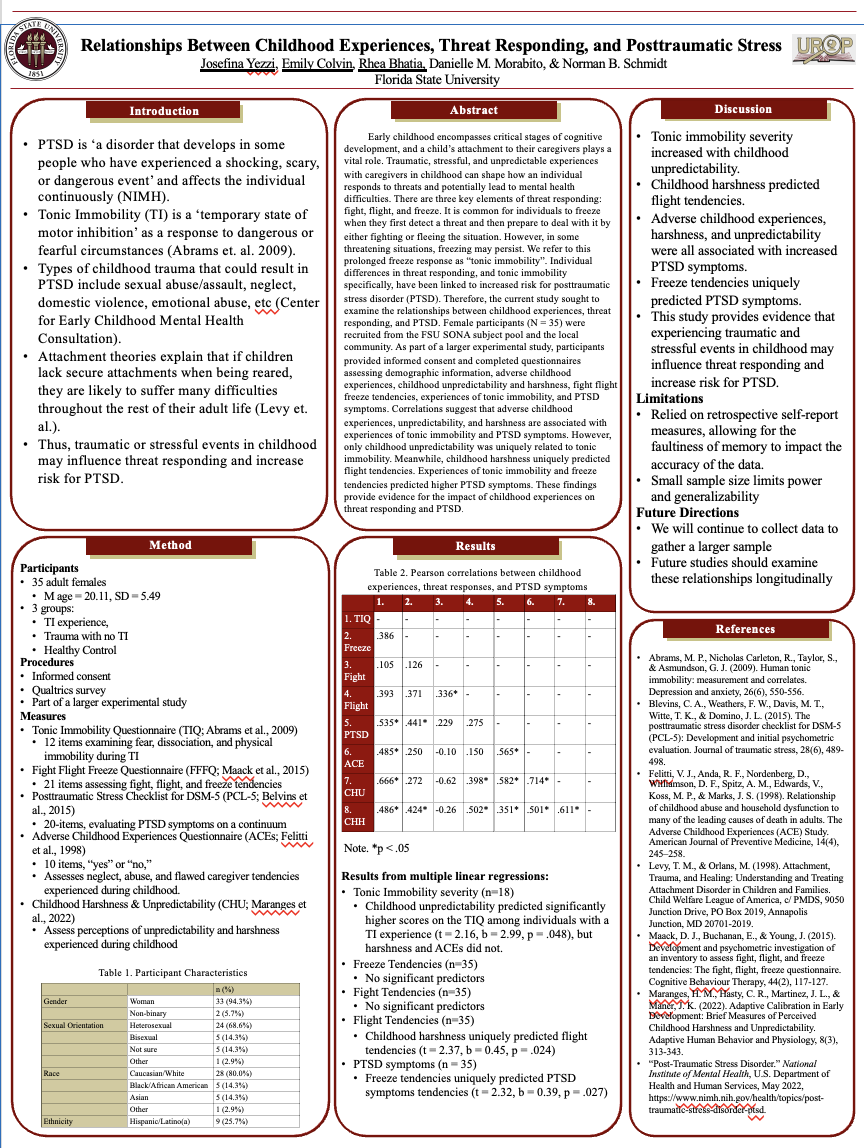Research Symposium
23rd annual Undergraduate Research Symposium, April 6, 2023
Emily Colvin Poster Session 3: 2:45 pm - 3:45 pm/ Poster #124

BIO
I am a junior from the Washington, D.C. area majoring in Psychology and minoring in Child Development. Currently, I am a Research Assistant in the MMTI Freeze Research Study in the Anxiety and Behavioral Health Clinic. After completing my first year at FSU abroad in Valencia, Spain, I returned to the main campus in Tallahassee and am a member of the CHAARG workout club and Best Buddies. In my free time, I love to do CrossFit, paint, and read! Some additional hobbies I have are snowboarding, scuba diving, and traveling.
My career goal is to be a behavioral therapist for children with autism. I have a passion for working with families and children affected by Intellectual and Developmental Disorders, and I plan to pursue a Masters in ABA Therapy after graduation.
Relationships Between Childhood Experiences, Threat Responding, and Posttraumatic Stress
Authors: Emily Colvin, Dr. Norman B. SchmidtStudent Major: Psychology
Mentor: Dr. Norman B. Schmidt
Mentor's Department: Psychology Mentor's College: College of Arts and Sciences Co-Presenters: Josefina Yezzi and Rhea Bhatia
Abstract
Early childhood encompasses critical stages of cognitive development, and a child’s attachment to their caregivers plays a vital role. Traumatic, stressful, and unpredictable experiences with caregivers in childhood can shape how an individual responds to threats and potentially lead to mental health difficulties. There are three key elements of threat responding: fight, flight, and freeze. It is common for individuals to freeze when they first detect a threat and then prepare to deal with it by either fighting or fleeing the situation. However, in some threatening situations, freezing may persist. We refer to this prolonged freeze response as “tonic immobility”. Individual differences in threat responding, and tonic immobility specifically, have been linked to increased risk for posttraumatic stress disorder (PTSD). Therefore, the current study sought to examine the relationships between childhood experiences, threat responding, and PTSD. Female participants (N = 35) were recruited from the FSU SONA subject pool and the local community. As part of a larger experimental study, participants provided informed consent and completed questionnaires assessing demographic information, adverse childhood experiences, childhood unpredictability, and harshness, fight flight freeze tendencies, experiences of tonic immobility, and PTSD symptoms. Correlations suggest that adverse childhood experiences, unpredictability, and harshness are associated with experiences of tonic immobility and PTSD symptoms. However, only childhood unpredictability was uniquely related to tonic immobility. Meanwhile, childhood harshness uniquely predicted flight tendencies. Experiences of tonic immobility and freeze tendencies predicted higher PTSD symptoms. These findings provide evidence for the impact of childhood experiences on threat responding and PTSD.
Keywords: Tonic Immobility, Childhood, PTSD

